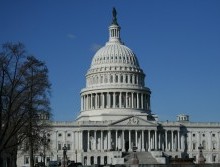
The US congress isn’t staying out of Iran talks. US Capitol building. Illustrative. By Joshua Spurlock
A self-imposed goal of reaching some type of agreement with Iran by the end of March is rapidly approaching, and hundreds of American legislators have laid out their interests in what a deal should look like. 367 members of the US House from both political sides urged US President Barack Obama to insist on an aggressive inspections regime, long-standing limits on Iran’s nuclear program, and answers regarding testing that can be used for nuclear weapons. In a veiled threat, the letter noted that the US sanctions relief sought by Iran in a deal with world powers can only be granted by Congress changing the law.
The letter, signed by more than 80 percent of the US House and posted to the House Foreign Affairs Committee website, comes after the German Foreign Minister noted over the weekend that talks with Iran are at a critical point.
“The negotiations on the Iranian nuclear program have taken us down a long road. The talks began more than a decade ago. Now we have entered the final phase,” said Frank‑Walter Steinmeier in a press release from his office on Saturday. “For the first time in all the years of negotiations, a diplomatic solution is now within reach.”
Steinmeier was speaking after a meeting with British, US, and French officials discussing the nuclear negotiations with Iran. The three European nations, along with the US, Russia and China, represent the global position in the talks with Iran.
The three European nations and US released a joint statement that was included in the German release, noting that meetings with Iran were to resume this week.
“We agreed that substantial progress had been made in key areas although there are still important issues on which no agreement has yet been possible. Now is the time for Iran, in particular, to take difficult decisions,” said the statement. “…We are at an important moment in the negotiations. If we are able to resolve all the main issues, technical work will follow to convert a framework into a detailed text.”
The forward-looking diplomatic statement comes after concerns have been expressed by Israel and legislators in the US that the nuclear deal on the table now will fail to adequately prevent Iran from eventually acquiring a nuclear weapons program.
That sets the background for the latest open letter regarding the talks from the US legislature, this one coming from the House after the last letter addressed Iran from members of the US Senate. The House members underscored the “grave and urgent issues that have arisen in these negotiations.”
Noting that Iran has proven deceptive and tried to get around international measures intended to curb progress in their nuclear program, the House letter said that “given Iran’s decades of deception, negotiators must obtain maximum commitments to transparency by Iran.”
In light of their concerns, the signatories of the letter insisted that they would only alleviate sanctions on Iran if a deal meets their minimum threshold.
“In reviewing such an agreement, Congress must be convinced that its terms foreclose any pathway to a bomb, and only then will Congress be able to consider permanent sanctions relief.”
(By Joshua Spurlock, www.themideastupdate.com, March 23, 2015)
